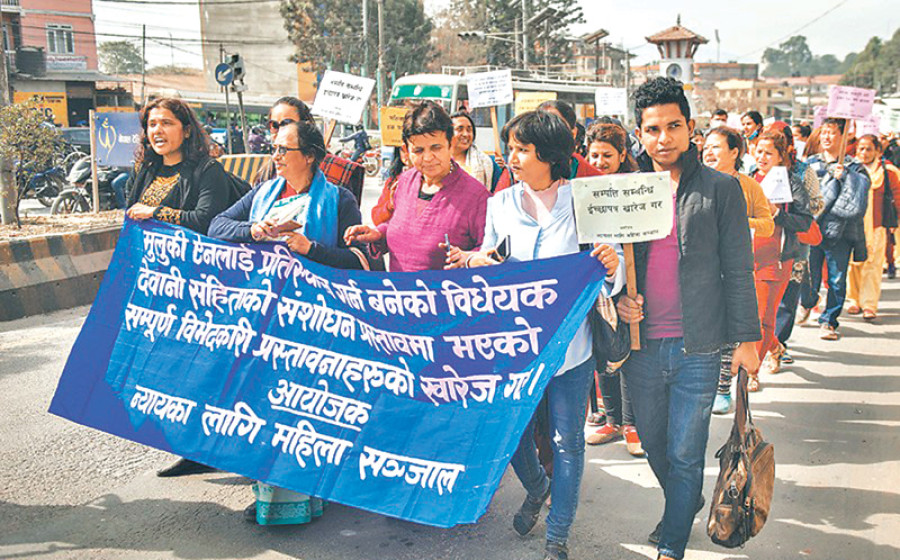Opinion
A regressive step
When the Gender Equality Act was passed a year ago, it finally put to rest the struggle for equal property rights for women.
Subin Mulmi
When the Gender Equality Act was passed a year ago, it finally put to rest the struggle for equal property rights for women. The women’s movement of Nepal was built on the quest for equal rights to inherit parental property. After two public interest litigations at the Supreme Court, five separate amendments of the Muluki Ain, and countless protests, women were finally recognised as equal citizens in terms of their right to claim property.
The bill of the Civil Code that replaces the Muluki Ain is on the verge of being endorsed by the Legislation Committee of Parliament. This means making substantive amendments to the bill will be difficult as it will then be tabled in Parliament for approval. Unless a majority of parliamentarians voice strong opposition to the bill, it will be passed in its present form. The Civil Code Bill addresses laws related to diverse issues of family, property and contracts, including provisions on inheritance, partition, marriage and divorce. Ever since the bill was submitted to Parliament, women’s rights organisations have expressed outrage at the provisions on property for a number of reasons.
Problematic provisions
First, the bill restricts a divorced woman from making any claim on the property of her husband if the divorce was initiated by the husband blaming the woman. Second, even in cases where a woman has successfully acquired property after a self- or mutually-initiated divorce, the property would need to be returned to the former husband if the divorced woman enters into another marriage. A similar provision applies to widows where they would be required to return the acquired property to the former husband’s family if they get married again.
Third, a will system is being introduced with the bill that would allow a person to bequeath property to anyone the person deems fit, but would impede a woman’s right to claim property which has been recognised as an innate right of every woman. The will system a familiar practice in other parts of the world and many parliamentarians have argued that it is time Nepal adopted it. However, because Nepal has hardly spent two years trying to implement the recently adopted Gender Equality Act, and considering that women only own 19.7 percent of the total land in Nepal, it would not be appropriate to introduce the will system now. Until there is substantive equality between men and women regarding property ownership, it can be safely assumed that the present cultural values will result in men benefiting disproportionately from the will system.
A more equal society
Before the amendment of the Muluki Ain in 1977, women were not considered eligible for parental property. This amendment allowed unmarried women aged 35 or above to claim parental property, but the property would have to be returned if they decided to get married. The 11th amendment of the Muluki Ain removed the age bar but retained the provision of having to return the property after marriage. After the promulgation of the Interim Constitution and the subsequent adoption of the Gender Equality Act of 2007, the provision was further amended removing the condition of having to return the property to the parents after marriage. However, the law was still discriminatory, as parental property could not be claimed by married women. Finally, the Gender Equality Act of 2015 extended this right to married women as well. After a span of almost four decades of continuous struggle, women’s property rights were finally gained.
The women’s rights movement in Nepal has not been just about removing discriminatory laws but also about advocating new laws that ensure substantive equality. This has led to the adoption of special and/or protective measures for women. These measures are of a temporary nature and are supposed to be repealed after women attain a degree of substantive equality. In addition to a women’s right to claim parental property, the movement advocates ensuring that women receive property in the form of alimony and/or child custody from their husband after divorce. Single or divorced women still face social and economic challenges in our society, and this property aims to lessen their burden. Although a few cases have been reported in the Capital where women have allegedly abused this law to extort money from their husbands’ family, such exceptional cases cannot be used to undermine the fact that divorced women are still not considered ‘marriageable’ in Nepali society.
There has always been a group of men who have vocally opposed such protective laws that they feel are unfair to men. It is a no-brainer that the Civil Code is a major setback for the women’s movement and has sown the seed of a retaliatory movement for men. It reverses the special measures adopted for women to attain substantive equality in the ownership of property, falsely assuming that women are now equal to men in terms of exercising their right to property. This might open the floodgates to more limitations on women’s rights in issues like domestic violence, sexual violence, sexual harassment and sexual and reproductive health rights, where women have been conferred special protective rights.
Mulmi, a human rights lawyer, works for Forum for Women, Law and Development




 18.12°C Kathmandu
18.12°C Kathmandu










